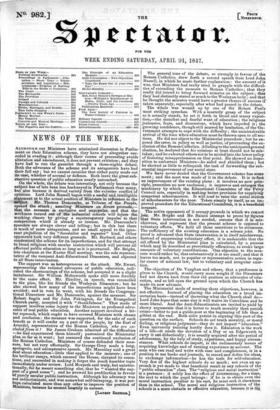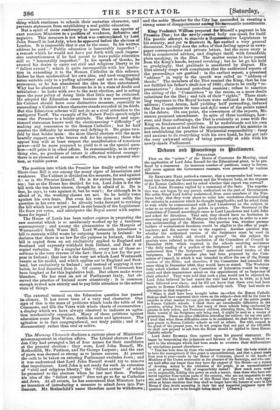NEWS OF THE WEEK.
ALTHOUGH our Ministers have minimized discussion in Parlia- ment on their Education scheme, they have not altogether suc- teded in evading it : although their course of proceeding avoids alteration and amendment, it does not prevent criticism ; and they have had to run the gauntlet through a three-nights debate. Both the advocates of the scheme and its antagonists have had their full say ; but we cannot consider that either party made out its case, whether of accusal or defence. Both leave the great sub-, stantive question of public education nearly untouched.
On the whole, the debate was interesting, not only because the subject has of late been less hackneyed in Parliament than many, but also because it derived variety from the extreme conflict of opinions. Lord John Russell began with a useful and intelligible statement as to the actual position of Ministers in reference to the subject. Mr. Thomas Duncombe, as Tribune of the People, opened the attack ; assailing Ministers on divers grounds,— that the measure is exclusive and unpopular, and that the workmen turned out of the industrial schools will injure the working classes by giving a supererogatory impulse to that competition which is already so intense. Mr. Duncombe's speeches are always clever and telling ; but in this last there is much of mere antagonism, and no small appeal to the igno- rant prejudices of the 'forestaller and regrater" kind. Other opponents took very different grounds. Mr. Roebuck and others condemned the scheme for its imperfections, and for that attempt to blend religious with secular instruction which will prevent all effectual public education so long as it is protracted. Mr. Bright, late chairman at the Exeter Hall meeting, was the sole represen- tative of the rampant Anti-Educational Dissenters, and objected to all State intervention.
The support was as heterogeneous as the attack. Mr. Ewart, representing the-rational advocates of public education, indi- cated the shortcomings of the scheme, but accepted it as a slight instalment. Sir William Molesworth spoke still more forcibly to the same effect. Mr. Hindley, in speech, was reconciled to the plan, like his friends the Wesleyan Dissenters ; but he also showed how many -of the imperfections might have been avoided ; and in vote he went,, with his friends the Congrega- tional Dissenters and Mr. Duncombe, against the measure. Sir Robert Inglis and Sir John Pakington for the Evangelical Church party, accepted it with " thankfulness." That mode of support involves some injury to the Ministers as professed advo- cates of real public education. Another support involved a bit- ter reproach, which ought to have covered Ministers with shame and confusion: the measure was supported, for the sake of such benefit as it will confer on a part of the people, by the Earl of Arundel, representative of the Roman Catholics, who are ex- cluded from it ! Sir James Graham admitted all the difficulties he had experienced them himself; patronized the Ministerial plan so far as it went ; but censured the continued exclusion of the Roman Catholics. Ministers of course defended their mea- sure, but not very. effectually. Sir George Grey made a long, apologetic, and unimpressive speech. Mr. Macaulay said a great deal about education—little that applied to the measure ; one of his brilliant essays, which amused the House, elevated its sensa- tions, and succeeded in making it forget the much humbler topic immediately under review. Lord Morpeth said truly, but uninten- tionally, for he meant something else, that he " wanted the sup- port of a good cause "; and he avowed his predilection in favour of purely secular public instruction. Although his advocacy was not indiscriminate, and was somewhat self-betraying, it was per- haps calculated more than any other to improve the position of Ministers, because he seemed heartily in earnest.
The general tone of the debate, so strongly in favour of the Roman Catholics, drew forth a second speech from Lord John Russell, in which he made further explanation : the amount of it was, that Ministers had really tried to grapple with the difficul- ties of extending the measure to Roman Catholics ; that they really did intend to bring forward minutes on the subject ; that they had distinctly stated as much to the Wesleyan body ; and that he thought the minutes would have a greater chance of success if taken separately, especially after what had passed in the debate.
The whole was wound up by one of Sir Robert Peel's most striking speeches. With a masterly grasp of the subject as it actually stands, be set it forth in broad and massy exposi- tion,—the manifest and fearful want of education ; the religious jealousies, fears, and dissensions, which have impeded it ; the growing confidence, though still marred by hesitation, of the Go- vernment attempts to cope with the difficulty ; the unmistakeable arrival of the time when education must be thrown open to all sec- tions. He did not object to the Ministerial procedure ; but he ex- posed the error, in policy as well as justice, of protracting the ex- clusion of the Roman Catholics. Alluding to the anticipated general election, he declared that his opinions at least should not be mis- taken; and he exhorted others not to be misled into the lower policy of fostering misapprehension on that point. Re showed no dispo- sition to embarrass Ministers—he aided and shielded them ; but he showed as little to relinquish the task of forwarding the sub- stantial improvement of our social state. We have never denied that the Government scheme .has some merit ; and the most was made of it in the debate. It is in-fact an improvement of the existing plans : it involves no new prin- ciple, prescribes no new exclusion ; it improves and enlarges the machinery by which the Educational Committee of the Privy Council acts, especially in making better provision for supplying competent schoolmasters. It will tend to raise the social station of schoolmasters for the poor. Taken simply by itself, as an im- proved procedure for the Educational Committee, it is a beneficial measure.
The active opponents of it occupy grounds in which we cannot join. Mr. Bright and Mr. Baines attempt to prove by figures that State intervention is not needed, assume that it is mis- chievous, and represent that the present scheme is opposed to voluntary efforts. We hold all those assertions to be erroneous. The sufficiency of the existing education is a solemn joke. No proof is advanced that State intervention is in itself mischievous: Instead of suppressing voluntary effort, it is undeniable that the aid offered by the Ministerial plan is calculated, by a process which may be described as proverbially efficacious, to evoke large' amounts of voluntary contributions. Our objection to the mea- sure would rather be, that substantively it is too small ; and that it leaves too much, not to popular or representative action in regu- lar course of national law, but to voluntary and irregular exer- tion.
The objection of Dr. Vaughan and others, that a preference is given to the Church, would carry more weight if the Dissenters had not drawn back from their old position as advocates of edu- cation, and so left open the ground upon which the Church has made its new advance.
The Ministerial mode of meeting these objections, however, is not effective. Instead of placing. the education on a broad un- sectarian basis—instead of decreeing what the Church shall do— Lord John hopes that some day it will waive its Catechism and be more liberal. And the Anti-Educationists are invited to yield by showy arguments that it is better to teach morality than punish crime—better to put a guide-post at the beginning of life than a gibbet at the end. Both sides persist in arguing this part of the question on the surface. Schools do not teach morality, or moral feeling, or religious judgment—they do not impart "education." Even university training hardly does it. Education is the work of a life—it needs the devotion of a Day or an Edgeworth to carry it out didactically; it is usually acquired after the period of adolescence, by the help of study, experience, and happy circum- stances. What schools do impart, is the rudimentary means of
acquiring knowledge and of turning experience to account. The man who can read and write with ease and completeness, is in a position to use books and journals, to record and define his ideas, to exchange information—he has the tools for self-education. Very few of the highest schools do so much ; not even an ap- proach is yet made to that beneficial result in any schools of the "public education" class. The "religious and moral instruction" is a pretence : it solely has the effect of determining, for a time,
the sect to which the pupil belongs : if he is to obtain even the moral instruction peculiar to his sect, he must seek it elsewhere than in the school. The moral and religious instruction of the school') is a mere obstacle to effective education, becalitc it is Ch.
thing which continues to schools their sectarian character, and prevents statesmen from establishing a real public education.
But a spirit of mere conformity to more than one species of cant restricts Ministers to a position of weakness, defensive and negative. This measure is not what was contemplated by Lord John Russell in lass July, when he appeared before the electors of London. It is impossible that it can be the same. In his written address he said—" Public education is lamentably imperfect" ; a remark which he would not have put forth with such impres- sive sententiousness if he had meant to leave public education still so " lamentably imperfect." In his speech of thanks, he avowed his desire to carry out civil and religious liberty to its "fullest extent "; which is quite incompatible with his hesita- tion in extending it to the Roman Catholics in this scheme. Either he then misdescribed his own idea, and used exaggerated terms suitable only to a puffing advertiser and not to an English statesman, or he has abandoned the idea he then entertained. Why has he abandoned it? Because he is in a state of doubt and tribulation : he looks with awe to the next election, and is acting upon the poor policy of doing little that little may be criticized. He adopted the Education cause because it was necessary that his Cabinet should have some distinctive measure, especially in succeeding a Cabinet whose character stands recorded in its deeds. But this Education scheme will not do as a rival attraction to the castigated Tariff. The example of Sir Robert Peel's speech might rouse the Premier to a bolder attitude. The shrewd and expe- rienced statesman knows well the electioneering " difficulty " of making any concession to the Roman Catholics ; but he half crushes the difficulty by meeting and defying it. He gains two- fold by that bolder mien : the more liberal electors will the more heartily support one who braves risk for his opinion ; those who oppose him will at least respect the manifestation of conscious power—will be more prepared to yield to it on the special ques- tion—will prize it in other affairs. In statesmanship, as in every- thing else, no goodness of intent is effectual without courage : there is no element of success so effective, even in a general elec- tion, as visible power.



























